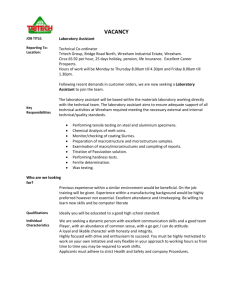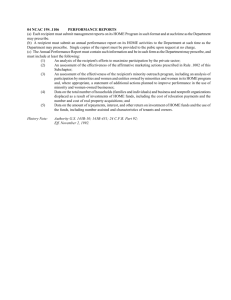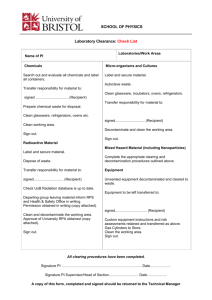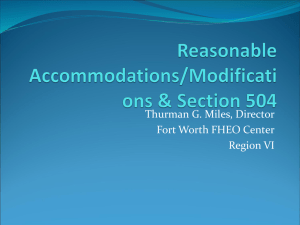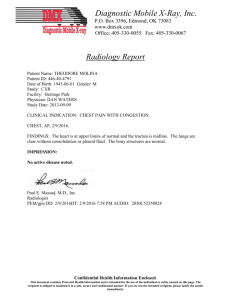Appendix 6 – Employment Agency Flowchart
advertisement
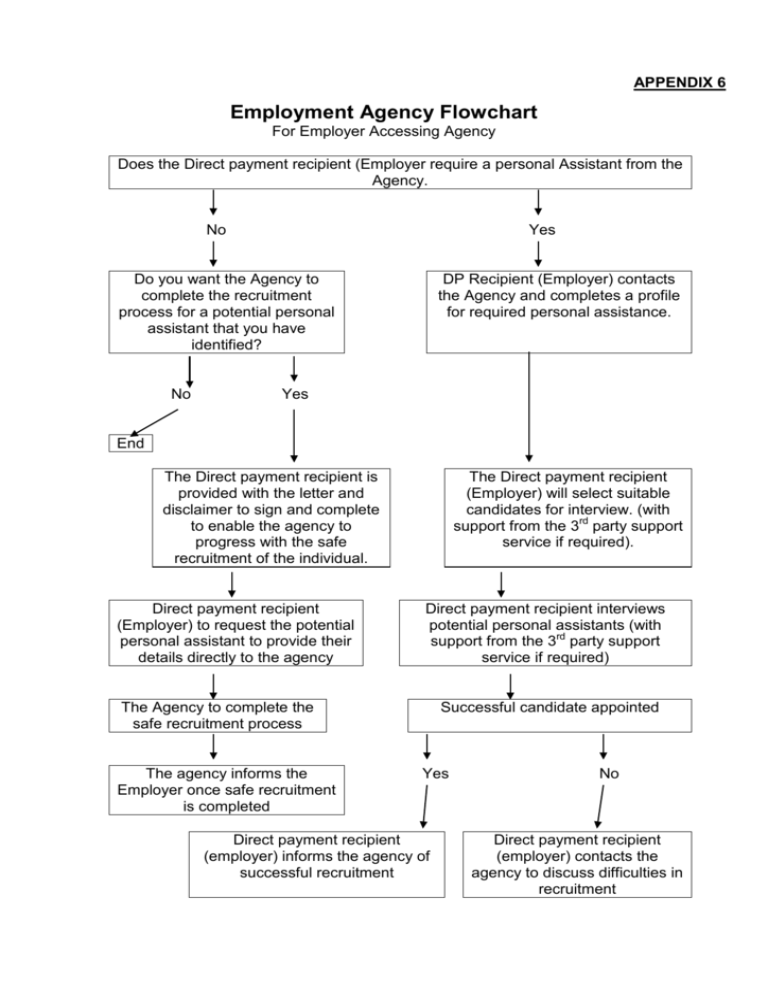
APPENDIX 6 Employment Agency Flowchart For Employer Accessing Agency Does the Direct payment recipient (Employer require a personal Assistant from the Agency. No Yes Do you want the Agency to complete the recruitment process for a potential personal assistant that you have identified? No DP Recipient (Employer) contacts the Agency and completes a profile for required personal assistance. Yes End The Direct payment recipient is provided with the letter and disclaimer to sign and complete to enable the agency to progress with the safe recruitment of the individual. Direct payment recipient (Employer) to request the potential personal assistant to provide their details directly to the agency The Direct payment recipient (Employer) will select suitable candidates for interview. (with support from the 3rd party support service if required). Direct payment recipient interviews potential personal assistants (with support from the 3rd party support service if required) The Agency to complete the safe recruitment process The agency informs the Employer once safe recruitment is completed Successful candidate appointed Yes Direct payment recipient (employer) informs the agency of successful recruitment No Direct payment recipient (employer) contacts the agency to discuss difficulties in recruitment Glossary Ability to manage – capacity (with or without support) to arrange a direct payment service to meet an assessed need. The ability to ‘direct’ is more important than the ability to ‘manage’. Independent Advocacy - is a service provided by organisations set up for the specific purpose of enabling people who are unable to make their voice heard to clarify their options, make choices and express their wishes and feelings. Advocates take their partner’s side and, when necessary, speak on their behalf so that they feel they've been fully heard, understood and included in decision making processes. Advocacy also helps to ensure that individuals’ human rights are fully respected, that they obtain the services they need and receive their full entitlements. Independent advocacy supports individuals to self-advocate whenever possible. Assessment – collection and interpretation of data to determine an individual’s need for health, personal and social care and support services, undertaken in partnership with the individual, his/her representative/advocate and relevant professionals. Capacity – ability to make a decision, with support if needed. Common Law incorporates a presumption of capacity – that is, everyone is presumed to be able to make decisions for themselves until proved otherwise. Incapacity is defined in Making Decisions (Lord Chancellor’s Department, 1997) as ‘unable by reason of mental disability to make a decision on the matter in question; or unable to communicate a decision on that matter because he or she is unconscious or for any other reason’. Care Plan - a written plan of the services that an individual will receive, this includes Community Care Plans. Children in Need Plan – is a written plan of the services that have being identified for the Child in Need. Close relative – someone related to the direct payment recipient in one of the following ways: parent, parent-in law, aunt, uncle, grandparent, son, daughter, son-in-law, daughter-in-law, stepson or daughter, brother or sister. Consent – the legal agreement to a choice or action (i.e. to take on a direct payment) freely made by an individual without coercion, as well as acceptance of the responsibilities associated with that choice or action. In a legal context, the individual must be ‘mentally capable’ of giving consent before it is valid. Control – having autonomy and power over your own life and what happens to you, regardless of how much support you need to put your choices into action, having self-determination. Decision-making – the process of making choices which lead to decisions and action. The word ‘decision’ is also used in legal contexts. Some people require support (e.g. communication support or advocacy) to consider and make decisions. Individual/Service user - includes all actual and potential Direct Payment service users (disabled Adults, Carers, Parent carers) Mixed package – a direct payment plus a directly provided social care service. Parental responsibility – in the Children Act ‘parental responsibility’ means all the rights, duties, powers, responsibilities and authority of parents in relation to the child and his or her property. People other than parents, for example, grandparents or guardians, can have parental responsibility for a child. Power of attorney – authority given by one person to another to act on his or her behalf. An enduring power of attorney (EPA) is entered into by a person with legal capacity and authorises the appointee to continue to act for him or her in business or legal matters if he or she loses capacity. Practitioner – Means the Social Worker, Care Manager Third Party Support Agency - means the organisation that is contracted by Wrexham County Borough Council to provide support for Direct Payment Recipients to set up and manage their Direct Payment Services - the services that are arranged for the individual by the Local Authority, which includes community care services, family support services, and services to carers. Supported Accounts – A supported account can be used if a service user has or has had difficulty in managing their funding and spending it in an appropriate way or a service user may have been vulnerable to financial abuse in the past. Funds that would normally be paid to the individual are paid to an organization, which then pay independent agencies or support staff as required. But the user’s choices and preferences direct the decision-making, and the user retains control of and is accountable for the arrangements. User-controlled trust – a legal arrangement by which a third party/agent helps the direct payment recipient to manage their direct payment, for example, by receiving and handling the money, but the user’s choices and preferences direct the decision-making, and the user retains control of and is accountable for the arrangements. Wrexham Direct Payment Development Group - means the local Wrexham reference group that has representation from service users, practitioners, commissioners and the support agency. The group is responsible for local & national consultation requests, to develop and promote the Direct Payments Scheme, to oversee the implementation of Direct Payments, to take forward specific areas of development and liaise and maintain links with other nominated groups. Wrexham Direct Payment Agreement - means the contract drawn up between Wrexham Social Services and the individual Direct Payments recipient that details the respective responsibilities and liabilities of the service user and Wrexham Social Services Department. Wrexham County Borough Council Vetting Agency – means the service that carries out safe recruitment checks for Direct Payment Service Users Employees.
